Not sure if any of you caught the Henry Seigman essay about Sharon and the Palestinians in the NY Times Magazine a couple of weeks ago, but i just couldn't let it go without offering a different perspective (my own).
Just a few comments I'd like to share regarding the review........
1) Seigman's entire thesis is bases on a naive, fantastical notion that giving land to the Palestianians will "end the conflict", as stated in his opening paragraph. What could possibly make this guy believe that a simple piece of land is what these people truly want? Has he just now awoken from a coma? The Palestinians have shown time and again that nothing less than 100% of Israel will satiate their rabid desires.
2) Seigman's pro-Palestinian bias is clearly evident throughout the entire review. While he is quick to point out the few voices within the Israeli govt. who claim there's no evidence to support a notion of a pre-planned Intifada, he completely ignores the hundreds, if not thousands of opinions within the Israeli military and intelligence establishment, as well as the documented perspectives of many of arafats aides and associates who support the commonly held belief that the intifada was planned long before Sharon's now famous visit to the holiest site in all of Judaism. Even Marwhan Barghouti still brags about his tactical planning to launch the intifada "when the time was right" (J. Post, 11/25/05)
3) Seigman cannot conceal the fact that he is either in the employ of, or vying for some sort of recognition by Peace Now. His essay is based entirely on facts provided by this extremely biased, non-scientific organization.
I will take just a minute to dispute his/their findings. Seigman attempts to glamorize and exaggerate the size of the "new" construction developments in the territories. He states that in the almost 500 settlements there are currently 3700 new construction projects. Even if this were true, that would mean less than eight new homes per town (or, what the rest of the anti-semetic world refers to as "settlements"). But the fact remains that this figure of "new construction" is both distorted and incorrect. In reality, Peace Now considers any building project to be new construction. For instance, any new room added to an existing home, any new road added to existing towns to better accomodate current residents, and even new roofs on existing homes are considered "new construction" by this Jew-hating, arabist organization. I doubt if Seigman has ever, or even cares to, take a ride thru Samaria and Judea to actually see what this organization considers "new construction".
In the meantime, neither Seigman nor Peace Now bother to calculate any of the illegal land grabs and true "new construction" occuring on a daily basis by the palestinians in the disputed territories.
4) If the reader can get beyond Seigman's hatred of Sharon and the rest of the Jewish leadership, both past and present, he should consider where Seigman's hope for the palestinian future lies. (Please keep in mind that I write Palestinian future, b/c Seigman obviously has no concern for an Israeli future living side-by-side with a PEACEFUL neighbor). Seigman's optimism lies with a so-called "young guard" within the palestinian national movement. While Seigman devotes a significant part of his essay to what he see's as a promising future based on this new movement, his only basis for optimism lies in the fact that they seem to be clamoring for leadership that is not as corrupt as past palestinian leadership - ie. don't steal all of our money.
While this is an admirable quality to be desired from a national movement, it in no way addresses this movements intentions vis-a-vis the State of Israel. It's one thing to push for economic reform, its an entirely different thing to ask for religious tolerance and an end to terrorism. Seigman seems to think Sharon's demands for a halt to incitment, a crackdown on terrorism, and conducting peaceful negotiations are not an attempt to protect Israeli lives and allow it's citizens to live in a free and peaceful society, but instead he portrays an image of brute force in an attempt to steal someone else's freedom and property. Bullucks! His confidence in this "young guard" somehow overlooks the fact that these "young guardians" were raised in a school system flooded with hatred, incitment, and death squad training.
5) Seigman claims that the notion of a palestinian desire to annihalate the State of Israel is completely unfounded and paranoid. I wonder how he explains the fact that the PA charter constitution still calls for the destruction of Israel??? Or why their school books still teach hatred of Jews and Israelis? Why the government sponsored media runs anti-semetic programming 24/7? How does he explain the fact that their maps still do not include The State of Israel??? How does he justify the madrassas and their preaching? What about the jubilation in the streets any time catastrophe strikes Israel or the US?
Seigman obviously missed last weeks interview with Abdel Bari Atwan, editor of the London-based daily al-Quds al-Arabi, in which he described his conversation with arafat immediately after he signed the Oslo agreement. Atwan states that arafat said he agreed to sign the Oslo Accords because he was hoping the agreements would force thousands of Jews to flee Israel. (Jerusalem Post, 11/21/04)
Seigman is living in a world of fantasy, one in which he has conveniently skipped over the last 120 years of history. He has come back to life as an idealist without a cause. If only he would look into the facts a little more closely.
Just my personal thoughts.
November 30, 2004
November 28, 2004
Not sure why it's taken me so long but I finally added a link (below) to Dmitriy Salita's website. This guy's an observant Jew and undeafeated professional boxer. He's currently 20-0 in the Junior Welterweight division and is coming off his most difficult fight, a unanimous decision that went the distance in NYC last week. This kid is legit in both his religious lifestyle and also in his talents in the ring. Some friends and I flew out to L.A. last year to see one of his fights and he was truly a Kiddush Hashem inside and outside of the ring.
He's a great story - immigrated to the US from Russia as a kid, pushed around by anti-Semetic bullies on the streets of Brooklyn, found boxing and then found Chabad, both of which changed his life. He doesn't fight on Shabbat so HBO has been forced to change the times of his fights in order to televise him pummelling some poor fellow after havdalah.
Dmitriy's next fight should take place sometime around February '05. In the meantime, rumors are circulating that Eminem has been selected to play Dmitriy in Jerry Brockheimer's movie about D's life. Eminem's been working out with legendary boxing trainer Emanuel Stewart for several months. The movie should be out by summer of '06.
Make sure to support this guy.
CLICK HERE TO SEE A MOTZEI SHABBAT WHOOPIN'
November 26, 2004
So I'm back, and here's what's on my mind...........
Throughout the course of our lives, we face continuous challenges, struggles, and setbacks. This is an inevitable fact of life to which none of us are immune. No matter if we are rich, poor, young or old, famous or anonymous; our lives are constantly rife with tests and trials. And of course, much of our time and energy seem to be spent trying to overcome the tests in front of us rather than reaping the benefits of the challenges we've left behind.
"Be Deliberate in Judgment" Last year, on Shavuot I think, I stumbled upon this verse in Pirkei Avot (Ethics of our Fathers) and it's helped shed some light on the mindset required to overcome and succeed in the face of many of life's challenges. It feels a bit weird to say I "stumbled" on this verse as it's located in the very first Mishna within the first chapter of Avot, and in fact is the very first piece of advice offered by our sages to the subsequent multitudes of generations to study these words from our Fathers. (This should tell us something of the importance our forefathers placed on this statement, by making it the very first statement of the entire tractate.) Be deliberate in judgment
Perhaps I "stumbled" over this little jewel because most of the commentaries surrounding this statement seem to revolve around judging your fellow neighbors, co-workers, spouse, and friends in a favorable manner. While this lesson of judging others favorably is crucial to maintaining a sense of humility, and also to maintaining healthy relationships with human beings and G-d as well, I find many of the existing commentaries on this first Mishna to be somewhat lacking and missing the mark. First of all, doesn't the Mishna choose the word "deliberate" and not "favorable"? There's a big difference between these two words. And secondly, the popular commentaries tend to focus on the judgment of others. Rarely have I seen commentaries developed around the concept of being deliberate in the judgment of one's self as well as the situations one may find him/herself struggling through. But sitting on the rocks of Diversey Harbor one day last year, I realized that perhaps, at least in my own mind, this is what our forefathers really meant when they said Be deliberate in judgment.
Many times we are our own harshest critics and I think the same can be said for being our own harshest skeptics. Sometimes it can be difficult to see the forest through the trees. And unfortunately, when we have a skewed or inaccurate image of ourselves, we find it much more difficult to relate to the people around us in a healthy manner. How many times have we judged ourselves too harshly based solely on of our recent actions and behavior instead of looking at all we have done in our lives, how much we've grown, and just as importantly, if not more so, how much further we will go. The final verdict's not even in yet, so how can we possibly proclaim a judgment on ourselves?
How many times have we found ourselves in situations that seem impossible to work through and which seem to have no chance of a successful outcome, only to find ourselves feeling completely relieved with the final results? I know that in my lifetime, I've been through many situations like this. I've also seen family members and friends struggle through situations that can leave them desperate, confused, and even depressed. Yet in almost every case, the end result was one that far exceeded their expectations and left them feeling a tremendous sense of relief and thankfulness.
To be deliberate means to slow down, take your time, and try not to be hasty. Let things play out, give things a chance. This applies not just to how we treat others, but to how we treat ourselves. Before we can judge others fairly and accurately, we must be able to do the same for ourselves. Unfortunately, many people rarely look back and learn from their mistakes in this area and continually find themselves repeating the same process. Admittedly, it can be quite painful to realize that we, as humans, tend to jump to conclusions which lead us to a resistance to the belief that success is possible, and that the situation really isn't as bad as it seems. More times than not, we act as a judge delivering the verdict long before hearing and seeing all the facts.
I believe the lesson our forefathers' wanted to teach us was not only about judging others favorably, but also about the power of time and how it affects our judgments about ourselves and those around us. The key is to be a person of level-headedness, not jumping to conclusions. We needn't judge ourselves, our environment, and our friends before gathering all the facts and allowing for sufficient time to sink in. Do not allow the fear that comes along with difficult situations to become your demise. Life is a challenge and will always be filled with the usual ups and downs, blessings and curses. But by keeping a steady hand, a balanced outlook, and allowing the facts to develop we will be able to cross the bridge.
And whatever applies to us as individuals also applies to us as a Nation, so I think this principal can easily be applied to the Jewish People as a whole. We've overcome every other challenge we've faced, and with time, wisdom, and Hashem's guidance, we will overcome our current predicament as well. We must remember to be deliberate in our judgment of our situation today, tomorrow, and always. But as we've seen in the past, our problems of today and tomorrow are sure to be resolved with an outcome that far exceeds any of our expectations.
Shabbat Shalom
Dedicated to my Mom and her new discovery after all these years!!! And also to the women in my ulpan who moved their families halfway across the world to live in Israel and raise their beautiful children without having a husband/father in the home. G-d bless you.
Moses received the Torah from Sinai and transmitted it to Joshua; Joshua to the Elders; the Elders to the Prophets; and the Prophets to the Men of the Great Assembly. They (the Men of the Great Assembly) said three things: Be deliberate in judgment, develop many disciples, and make a fence around the Torah.
November 19, 2004
This is hilarious
From Scrappleface.com
Bush Applauds Arafat's 'New Attitude'
(2004-11-12) -- U.S. President George Bush today praised Palestinian leader Yassir Arafat for "assuming a new attitude," according to a White House spokesman.
"The president believes that Chairman Arafat's new attitude is one that bodes well for peace in the Middle East," said spokesman Scott McClellan. "Arafat's rhetoric has cooled in recent days."
U.S. negotiators reportedly expect the Palestinian leader to put up less resistance to reasonable proposals, thanks to "a new posture that is more grounded, stable, consistent."
"Chairman Arafat seems to be taking an in-depth look at the land he has fought to defend," Mr. McClellan said, "and yet he's looking up to a promising future, where the grass is greener. President Bush has long believed that it's your attitude that determines your altitude, and Mr. Arafat has become a great illustration of that."
November 18, 2004
Joey Tartakovsky
Anybody needing a little pick-me-up after all the recent Israel bashing and arafat fantasizing should check out an amazing essay written by Joey Tartakovsky which is appearing on the VDH Private Papers website. This is highly recommened reading.
A quick snapshot of the essay...
The Holocaust destroyed forever the universe of European Jewry from which Einstein, Freud and Marx emerged,its culture, language, and two-thirds of its lives. But one of the most curious aspects of this narrative is that the survivors did not allow themselves to drown in a black ocean of loss and pity, or pledge eternal revenge against Germany. Instead, they set about to rebuild, painfully, but inspirited by a deep sense of faith and dignity. This moral character explains why Israel has never produced a suicide bomber, and why Palestine has never produced a real Nobel laureate. History is made not by unseen social forces but by men, and it matters dearly in the determination of a nations fate whether its Founding Fathers are men like David Ben-Gurion, Chaim Weizmann and Abba Eban and whether they are men like Hajj Amin al-Husseini, Sheik Ahmed Yassin and Yasir Arafat.
CLICK HERE FOR THE REST OF Israel, Campus Unreality, and Democratic Reality
November 17, 2004
Spain
In case any of you may still be considering a vacation to Spain, even after they threw the Jews out in 1492, and even after the cowardly removal of Spanish troops from Iraq, here's another piece of information that hopefully will convince you that Spain is no place for Jews to spend their money and/or time........
From the Jerusalem Post, 11/17/04
"Israel expects the Spanish government to fully condemn venomous slogans against Israeli Prime Minister Ariel Sharon that appear on a municipal billboard in the northern Spanish town of Oleiros.
The municipal electronic billboard in Oleiros features a sign that reads, "Let's stop the animal, Sharon the assasin, stop the neo-Nazi's".
Blatant anti-Semetism on a government owned billboard.............
November 16, 2004
Re-post
I've been a little bummed lately cuz I finally got off my arafat kick and actually typed a pretty good blog the other day, but it was somehow lost during the upload process. I think all the pictures I was trying to post may have caused the problem. I'm gonna try to post the pictures again and we'll see what happens. No promises on recapturing the thoughts I had put down, but maybe you'll be able to get an idea of what I've been doing.
Before I get down to business, I'm wondering if the background on the blogsite is bothering anybody. Initially I received some negative feedback regarding the map and the fact that it interfered with some readers concentration as they tried to understand exactly what I was trying to say. We lightened the tone a bit, and I'm now wondering if this has been helpful at all. I welcome any feedback concerning the background.
OK, as for my time the last couple of weeks, it's been rather interesting. I finally ate falafel and schwarma with my nephew, spent an afternoon walking the walls of the Old City, helped make a surprise birthday party for one of the guys (and his twin sister) in our ulpan class, went back to my teachers family in Maale Chever the last two Shabbatot, started working on Tuesdays in the Shomron picking grapes and olives, watched the IDF close off the entire West Bank for several days due to arafats untimely passing(why couldn't it have happened 30 years earleir?), started planning a possible Channuka trip, travelled to Kever Rachel in Bet Lechem, and realized that I don't have to ride in a Nesher taxi back to the airport to leave my beloved Homeland. This was definitely the highlight of the last ten days. In the past, every trip to Israel always seemed to include the inevitable depression that set in about a week before vacation ended as the reality of departure began to sink in. I, like most other tourists, would take that fateful step of calling Nesher to arrange for the final ride thru the country back to the airport. What a wonderful feeling to look up one day, see the Nesher sign, and realize how blessed I am to be living here now. So many of our ancestors never got the opportunity to step foot on this precious soil, and now I am trying to build a life here. Thank G-d I don't have to think about Nesher for a long, long time.
Oh, as for the new falafel/schwarma-less streak, it has offically begun. But I expect this go-round to be much more challenging as I have several falafel/schwarma loving friends coming from the States to visit this month. Additionally, I'm not sure what tangible benefits I would receive by staying away from such delicacies when I'm already beginning to cave in to the sweet smelling presence of the fluffy, powder-sugar covered, strawberry jelly filled sufganiyot, which have magically appeared on every street corner in Jerusalem.
Miss you all.
PEACE

Falafel nite
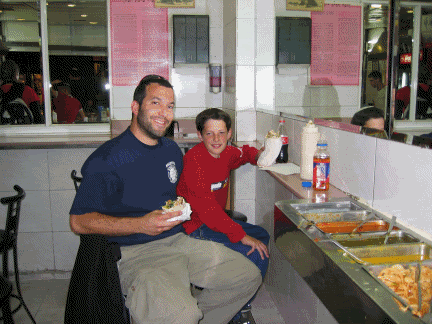
You ain't getting shit fat boy, we're closed

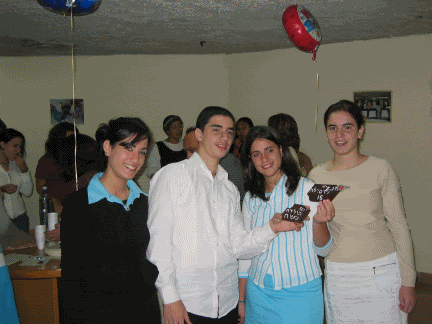

Tuesdays in the Shomron
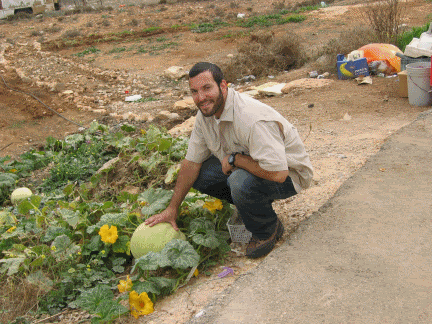
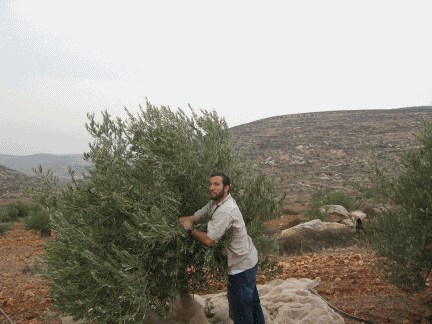
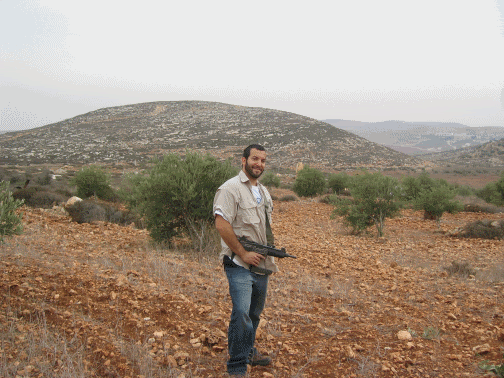
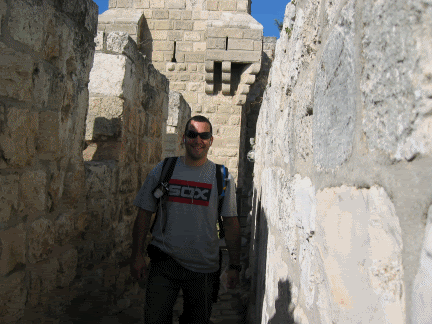

Erev Shabbat Rugelach Shopping
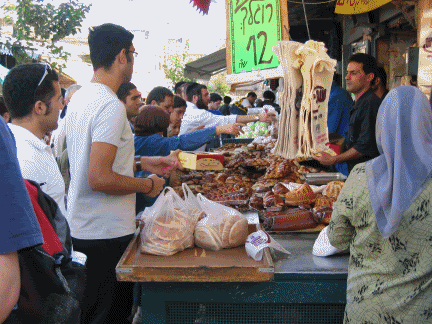
My niece

Hot Chick with 9mm at the shuk day arafat died

Artist's rendering
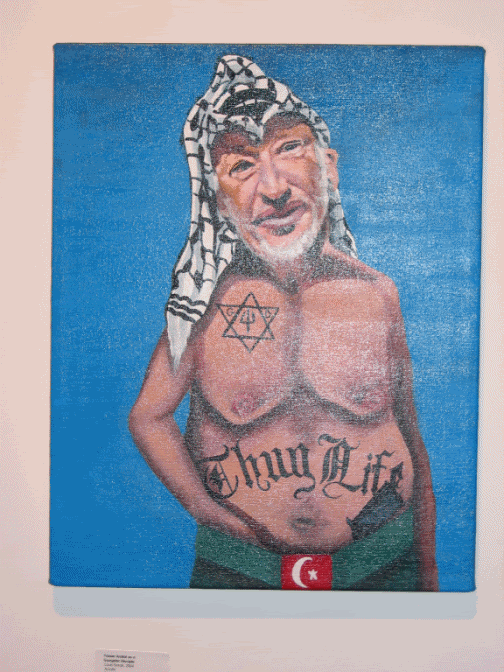
November 14, 2004
I assume that anybody reading this website understands what kind of filth arafat embodied. Lately, I have been accused of "rejoicing" at his death. I have to scratch my head and wonder how someone could actually believe that this is my intent. If relief and gratitude that this Jew Killer is finally in a place where he will do no more harm can be referred to as rejoicing, than fine. I can't imagine any of my friends feeling otherwise.
I am attaching a well written column by Jeff Jacoby that I hope will serve as a reminder of exactly who yasser arafat was and how he lived his life.
Arafat the Monster
By Jeff Jacoby, Globe Columnist | November 11, 2004
YASSER ARAFAT died at age 75, lying in bed surrounded by familiar faces. He left this world peacefully, unlike the thousands of victims he sent to early graves.
In a better world, the PLO chief would have met his end on a gallows, hanged for mass murder much as the Nazi chiefs were hanged at Nuremberg. In a better world, the French president would not have paid a visit to the bedside of such a monster. In a better world, George Bush would not have said, on hearing the first reports that Arafat had died, "God bless his soul."
God bless his soul? What a grotesque idea! Bless the soul of the man who brought modern terrorism to the world? Who sent his agents to slaughter athletes at the Olympics, blow airliners out of the sky, bomb schools and pizzerias, machine-gun passengers in airline terminals? Who lied, cheated, and stole without compunction? Who inculcated the vilest culture of Jew-hatred since the Third Reich? Human beings might stoop to bless a creature so evil -- as indeed Arafat was blessed, with money, deference, even a Nobel Prize -- but God, I am quite sure, will damn him for eternity.
Arafat always inspired flights of nonsense from Western journalists, and his last two weeks were no exception.
Derek Brown wrote in The Guardian that Arafat's "undisputed courage as a guerrilla leader" was exceeded only "by his extraordinary courage" as a peace negotiator. But it is an odd kind of courage that expresses itself in shooting unarmed victims -- or in signing peace accords and then flagrantly violating their terms.
Another commentator, columnist Gwynne Dyer, asked, "So what did Arafat do right?" The answer: He drew worldwide attention to the Palestinian cause, "for the most part by successful acts of terror." In other words, butchering innocent human beings was "right," since it served an ulterior political motive. No doubt that thought brings daily comfort to all those who were forced to bury a child, parent, or spouse because of Arafat's "successful" terrorism.
Some journalists couldn't wait for Arafat's actual death to begin weeping for him. Take the BBC's Barbara Plett, who burst into tears on the day he was airlifted out of the West Bank. "When the helicopter carrying the frail old man rose above his ruined compound," Plett reported from Ramallah, "I started to cry." Normal people don't weep for brutal murderers, but Plett made it clear that her empathy for Arafat -- whom she praised as "a symbol of Palestinian unity, steadfastness, and resistance" -- was heartfelt:
"I remember well when the Israelis re-conquered the West Bank more than two years ago, how they drove their tanks and bulldozers into Mr. Arafat's headquarters, trapping him in a few rooms, and throwing a military curtain around Ramallah. I remember how Palestinians admired his refusal to flee under fire. They told me: `Our leader is sharing our pain, we are all under the same siege.' And so was I." Such is the state of journalism at the BBC, whose reporters do not seem to have any trouble reporting, dry-eyed, on the plight of Arafat's victims. (That is, when they mention them -- which Plett's teary bon voyage to Arafat did not.)
And what about those victims? Why were they scarcely remembered in this Arafat death watch?
How is it possible to reflect on Arafat's most enduring legacy -- the rise of modern terrorism -- without recalling the legions of men, women, and children whose lives he and his followers destroyed? If Osama bin Laden were on his deathbed, would we neglect to mention all those he murdered on 9/11?
It would take an encyclopedia to catalog all of the evil Arafat committed. But that is no excuse for not trying to recall at least some of it.
Perhaps his signal contribution to the practice of political terror was the introduction of warfare against children. On one black date in May 1974, three PLO terrorists slipped from Lebanon into the northern Israeli town of Ma'alot. They murdered two parents and a child whom they found at home, then seized a local school, taking more than 100 boys and girls hostage and threatening to kill them unless a number of imprisoned terrorists were released. When Israeli troops attempted a rescue, the terrorists exploded hand grenades and opened fire on the students. By the time the horror ended, 25 people were dead; 21 of them were children.
Thirty years later, no one speaks of Ma'alot anymore. The dead children have been forgotten. Everyone knows Arafat's name, but who ever recalls the names of his victims?
So let us recall them: Ilana Turgeman. Rachel Aputa. Yocheved Mazoz. Sarah Ben-Shim'on. Yona Sabag. Yafa Cohen. Shoshana Cohen. Michal Sitrok. Malka Amrosy. Aviva Saada. Yocheved Diyi. Yaakov Levi. Yaakov Kabla. Rina Cohen. Ilana Ne'eman. Sarah Madar. Tamar Dahan. Sarah Soper. Lili Morad. David Madar. Yehudit Madar. The 21 dead children of Ma'alot -- 21 of the thousands of who died at Arafat's command.
November 10, 2004
Day thirty-eight and still no falafel/schwarma. Planning to take nephew to J-lem tomorrow for a falafel spree.
Now if I could just find some wings.
November 09, 2004
If you're still not convinced arafat's dying of HIV/AIDS, here's a hilarious video from Israeli TV. You need to have speakers for this.
Enjoy
CLICK HERE FOR ARAFAT VIDEO
November 07, 2004
ANOTHER ARTICLE DETAILING THE GROWING SUSPICION THAT ARAFAT IS DYING OF HIV/AIDS
Suspicions grow that Arafat is dying of AIDS
By israelinsider staff November 6, 2004
Former White House speechwriter David Frum has joined the growing chorus of pundits, medical experts, and intelligence operatives who claim Yasser Arafat is likely suffering from AIDS.
Frum, a key figure in Republican politics and the man who coined the terms "axis of evil," writes in National Review Online that Arafat's undisclosed illness is well-known, but has been kept under wraps by the mainstream media.
"Speaking of media bias, here's a question you won't hear in our big papers or on network TV: Does Yasser Arafat have AIDS?" asks Frum, who also writes for the National Post.
"We know he has a blood disease that is depressing his immune system. We know that he has suddenly dropped considerable weight -- possibly as much as one-third of all his body weight. We know that he is suffering intermittent mental dysfunction. What does this sound like?"
Earlier, John Loftus told John Batchelor on ABC radio on October 26 that Arafat is dying from AIDS. Loftus said the CIA has known this about Arafat for quite awhile and that as a result the US has encouraged Sharon not to take Arafat out because the US has known Arafat was about done. It was deemed better to have Arafat discredited as a homosexual.
Although homosexuality is rife in the Arab world, it is at least officially consider a sin and a crime, and regarded--especially in fundamentalist circles--as a mark of great shame and depravity.
Intelligence on "the tiger" romping with bodyguards
Frum pointed to KGB evidence linking Arafat to homosexual activities, citing a 1987 book by Lt.-Gen. Ion Pacepa, the deputy chief of Romania's intelligence service under Communist dictator Nicolae Ceausescu.
In his memoirs "Red Horizons," Pacepa relates a conversation in 1978 with Constantin Munteaunu, a general assigned to teach Arafat and the PLO techniques to deceive the West into granting the organization recognition.
"I just called the microphone monitoring center to ask about the 'Fedayee,'" Arafat's code name, explained Munteaunu. "After the meeting with the Comrade, he went directly to the guest house and had dinner. At this very moment, the 'Fedayee' is in his bedroom making love to his bodyguard. The one I knew was his latest lover. He's playing tiger again. The officer monitoring his microphones connected me live with the bedroom, and the squawling almost broke my eardrums. Arafat was roaring like a tiger, and his lover yelping like a hyena."
Munteaunu continued: "I've never before seen so much cleverness, blood and filth all together in one man." Munteaunu, wrote Pacepa, spent months pulling together secret reports from Egyptian, Jordanian and Syrian intelligence agencies as well as Romanian files.
"I used to think I knew just about everything there was to know about Rahman al-Qudwa," Arafat's real name, "about the construction engineer who made a fortune in Kuwait, about the passionate collector of racing cars, about Abu Amman," Arafat's nom de guerre, "and about my friend Yasser, with all his hysterics," explained Munteaunu, handing Pacepa his final report on the PLO leader. "But I've got to admit that I didn't really know anything about him."
Pacepa wrote: "The report was indeed an incredible account of fanaticism, of devotion to his cause, of tangled oriental political maneuvers, of lies, of embezzled PLO funds deposited in Swiss banks, and of homosexual relationships, beginning with his teacher when he was a teen-ager and ending with his current bodyguards. After reading the report, I felt a compulsion to take a shower whenever I had been kissed by Arafat, or even just shaken his hand."
"If true, Arafat would have a great deal to conceal from his people and his murderously anti-homosexual supporters in the Islamic world," writes Frum, suggesting that Arafat was airlifted to France for medical treatment because he "could trust the French to protect his intimate secret."
The medical evidence adds up
Palestinian Foreign Minister Nabil Shaath Monday said that all types of cancer had been ruled out, and the latest news is that French doctors have ruled out poisoning.
Medical observers note that a low blood platelet count is a sign of a weakened immune system, and indeed last week there were reports of a complete collapse of Arafat's immune system. Other than the ruled-out cancer, the low count could be attributed to bleeding ulcers, colitis, liver disease, lupus, or HIV. It is believed that ulcers and colitis have already been ruled out.
Arafat has lost a considerable amount of body weight. Hopital d'Instruction des Armees de Percy, southwest of Paris, is known to have some of France's best HIV/AIDS doctors. Other medical experts note that Arafat's activities in recent weeks and months suggest the dementia that accompanies late-stage AIDS.
Medical authorities not connected directly to his case are suggesting that he may have HIV/AIDS. One doctor reported to an Israel Insider source that his suspicions have been growing for more than a year.
"I began to see tell tale signs of kaposis sarcoma. His Parkinsonian tremor was more than just a Parkinsonian tremor and he was also showing signs of weakness. The rumor about homosexuality/bisexuality has been around for decades. So I put two and two together when they started talking about his health over a year ago. The talk of a mysterious illness in this day and age should be a tip-off. He has some of the best physicians in the world attending to him. He can be diagnosed clinically, without perfoming any tests. All the doctors surrounding him know what he has. All this cloak and dagger about tests is a ruse. They understand the implications of divulging that he has HIV. If I were Suha I would be getting a little concerned."
If Arafat has AIDS, that would also explain Suha's reticence to allow the release of significant information about Arafat's condition, and the almost ludicrously tight-lipped reports of the French hospital spokesman, and the refusal of anyone connected with Arafat to hold a press conference in recent days.
Here's an interesting piece discussing the possiblity that arafat is dying of HIV.
Enjoy:
Does Arafat Have AIDS?
by Malcolm Thornberry
(Paris) As French doctors continue to run tests on Palestinian leader Yasser Arafat some medical authorities not connected directly to his case are suggesting that he may have HIV/AIDS.
Palestinian Foreign Minister Nabil Shaath Monday said that all types of cancer had been ruled out.
Arafat has been visibly ill for more than two weeks. Last Wednesday he collapsed and briefly lost consciousness. Initial blood tests performed in the West Bank revealed a low blood platelet count. The Palestinian leader was airlifted to France where he is undergoing more tests.
But, with leukemia and other forms of cancer ruled out, the list of possible diseases is narrowing.
A low blood platelet count is a sign of a weakened immune system. In addition to cancer, the low count could be attributed to bleeding ulcers, colitis, liver disease, lupus, or HIV. It is believed that ulcers and colitis have already been ruled out.
Arafat has lost a considerable amount of body weight. Hopital d'Instruction des Armees de Percy, southwest of Paris, also has some of France's best HIV/AIDS doctors.
For several years there have been suggestions that Arafat was bisexual.
Ion Pacepa, who was deputy chief of Romanian foreign intelligence under the Ceaucescu regime and who defected to the West in 1978, says in his memoirs that the Romania government bugged Arafat and had recordings of the Arab leader in orgies with his body guards.
If the suggestions that Arafat has AIDS are true, it is doubtful it would be made public.
November 05, 2004
So the latest undisclosed reports have not yet confirmed this but......... it looks like the pajama clad, Dr. Dre gangsta ski cap wearing yasir arafat has undergone a complete lobotomy. Additionally, rumors have it that several photographers were roughed up by arafats goons after taking pictures that captured a steady steam of drool falling from his stubbly chin.
What a fitting end to this rats life. The final chapter finds him helpless, unable to dress himself, sitting in front of the world's cameras, a helpless little smile on his mug and a few guys that would prefer to see him dead, holding him in place.
You came from worms, and back to worms you will go. Adios. Good riddance.
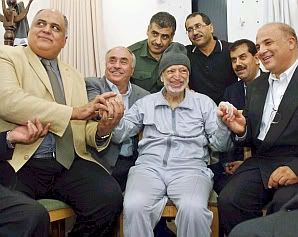
November 04, 2004
November 03, 2004
Day thirty-one and I still haven't had a falafel or schwarma. I think I'm beginning to crack. Will keep you posted.
November 01, 2004
It's important to step back sometimes and try to see the big picture.
I was walking home tonite, after another three hour teeth-breaking session of pouring over my homework, reviewing previous lessons, asking the coffeeshop waitress how to say "fruit shake", and trying to engrain various grammatical rules and exceptions into my memory, when I found myself thinking about how far I've come in only a few short weeks. When I first arrived, I lacked the most basic Hebrew language skills to even ask someone on the street for directions, much less interpret what the heck this person just told me. I mean, my seven year old niece was practically embarrased to be in the same room with me as I tried/pretended to speak Hebrew. Today, I feel fairly confident that I can hold a three minute conversation with almost anybody, albeit in my poorly constructed Hebrew. In ulpan this morning, we actually broke out the radio for the first time and began listening to the news. Later in the day, I had two personal phone conversations conducted entirely in Hebrew (you have no idea how intimidating the telephone can be when you don't speak the language).
At this point, I've got three favorite spots in town where the entire staff knows I'm trying to learn Ivrit. After three straight weeks of my stubborn insistence on ordering my coffee and water in Hebrew, they've finally given up on using English and speak to me solely in our mother tongue. Wherever I go, I insist on speaking Hebrew to everyone I come in contact with - bus drivers, store clerks, friends, teachers, kids, policemen, dogs, cats, you name it. I've even been known to tell people that I don't understand English. I carry a pocket-sized notebook (pinkas) with me at all times and I'm constanly asking people to repeat themselves so I can write down key phrases and terms. I never leave home without my two dictionaries and I'm constantly stopping for several minutes to read and understand street signs and billboards. Tomorrow nite I'm heading to Tel Aviv to meet an Israeli friend of mine who's graciously agreed to meet me for a couple hours each week just to sit and speak the language. In short, I'm really busting my ass to set some sort of record time for learning this language.
So all of this sounds really positive, right? Well, trust me, it ain't all peaches and cream (Outkast). Lately there've been as many bad days as good one's. There's a lot of frustration involved in overcoming such a great challenge. And because everybody seems to know how seriously I'm taking this, I frequently hear "So, can you speak Hebrew yet?" Of course their just joking, but within mere seconds my head begins lecturing me "When are you gonna finally learn this crazy language? What's taking so long?" It can be downright demoralizing when I think about how much I've studied and yet still find myself (on a very regular basis) in the midst of a group of Hebrew speakers with whom I can't even hope to keep up with. It's easy to get down, especially when I realize how much farther I have to go before becoming fluent.
I think my frustration can be attributed mostly to the lofty, perhaps unrealistic, expectations I've set for myself. On the one hand, I realize that practically nobody masters a new language in mere months, so I need not get upset when I feel like things aren't moving as fast as I'd like. But on the other hand, I feel that by keeping these expectations alive, I will continue to push myself to do more than I normally would and certainly more than most people dream of doing. So perhaps it's a healthy type of frustration.
I must take pause here and recognize that I am more fortunate than most in that I have absolutely no other responsibilities in life right now other than to learn Hebrew. Most people in ulpan spend the rest of their day working, going to school, parenting, learning in Yeshiva, etc... I have the luxury of spending my time focused solely on learning Hebrew.
OK, back to the story at hand... There's also the simple aspect of time itself. I've come to realize that no matter how hard I try, how much effort I exert, there's something that only the element of time can provide. The brain can absorb only so much at once. It's going to require a certain amount of time to allow the brain to rest and absorb all the various inputs I've been pouring into it. Time will allow for sleep, rejewvination, repetition, and experience in applying new learnings to different situations, conversations, and contexts. All of this is sorely needed before I can finally master everything that's required to hit the streets and become a true Israeli.
That being said, I still want to speak Hebrew NOW!
So lately I've become accustomed to feeling a bit frustated. But tonite, as I walked through the quite streets of Efrat, under crystal clear skies with the stars shimmering down on me, I realized something. I realized that I've learned a whole heck of a lot since I got here. I've moved up a level in ulpan, I can converse with the average Joe on the street, I'm compelely independant in my day to day life using as little English as possible, and I'm starting to recognize a lot of great potential. When I think about it all, I realize that if I accomplished all this in less than four weeks, what do the next two months have in store for me? I know there's always the law of diminishing returns to worry about, but I feel like there's still so much new material ahead, and if I keep myself dedicated and focused, the sky's the limit. I also know that the payoff for all this hardwork will be tremendous. Life here will be that much easier if I can converse in both Hebrew and English (I'll tackle Russian a bit later).
So there I was on the street, thanking G-d for bringing me to this point, for giving me the courage to not be embarrased by my mistakes, for providing me with the intellect to grasp such challenging material, and for blessing me with the strength and wisdom to tackle this using a method most other people shun, when I realized the most beautiful thing. Hashem desperately wants us to enjoy life and the world around us. I believe this is the reason for the commandment Hashem has given us to sit down before we go to bed each night and review our day. We're commanded to take a few minutes to think about all the things we did from the moment we woke up until the moment we decide to go to bed. We think about our accomplishments as well as our failures. What we did right and what we can improve upon. This ritual of "taking stock" of our lives on a daily basis provides us with a method by which we can more easily put things in perspective. Too often we go through life worrying about all the things that are troubling us and far too rarely do we take the time to appreciate what we really have and who we really are. It's a great opportunity to see all the gifts we've been given and to see how we can better put them to use. Many times when we do this, we recognize that we've accomplished far more than we initially thought.
I thank G-d for giving me this moment of clarity.




